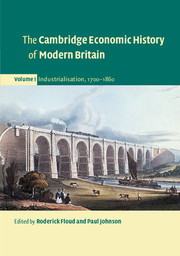Book contents
- Frontmatter
- Chapter1 Accounting for the Industrial Revolution
- Chapter2 Industrial organisation and structure
- Chapter3 British population during the ‘long’ eighteenth century, 1680–1840
- Chapter4 Agriculture during the industrial revolution, 1700–1850
- Chapter5 Industrialisation and technological change
- Chapter6 Money, finance and capital markets
- Chapter7 Trade: discovery, mercantilism and technology
- Chapter8 Government and the economy, 1688–1850
- Chapter9 Household economy
- Chapter10 Living standards and the urban environment
- Chapter11 Transport
- Chapter12 Education and skill of the British labour force
- Chapter13 Consumption in eighteenth- and early nineteenth-century Britain
- Chapter14 Scotland
- Chapter15 The extractive industries
- Chapter16 The industrial revolution in global perspective
- Bibliography
- Index
- References
Chapter1 - Accounting for the Industrial Revolution
Published online by Cambridge University Press: 28 March 2008
- Frontmatter
- Chapter1 Accounting for the Industrial Revolution
- Chapter2 Industrial organisation and structure
- Chapter3 British population during the ‘long’ eighteenth century, 1680–1840
- Chapter4 Agriculture during the industrial revolution, 1700–1850
- Chapter5 Industrialisation and technological change
- Chapter6 Money, finance and capital markets
- Chapter7 Trade: discovery, mercantilism and technology
- Chapter8 Government and the economy, 1688–1850
- Chapter9 Household economy
- Chapter10 Living standards and the urban environment
- Chapter11 Transport
- Chapter12 Education and skill of the British labour force
- Chapter13 Consumption in eighteenth- and early nineteenth-century Britain
- Chapter14 Scotland
- Chapter15 The extractive industries
- Chapter16 The industrial revolution in global perspective
- Bibliography
- Index
- References
Summary
INTRODUCTION
How do we account for the Industrial Revolution? In recent years, economic historians have had to redefine what they mean by the industrial revolution and to reassess its significance. On the one hand, the findings published in the 1990s by Crafts, Harley (Crafts and Harley 1992; Harley 1998) and others have reduced estimates of the rate of economic growth during the classic years of the industrial revolution, 1760 to 1830. These findings have been reinforced by recent work by scholars such as Antràs and Voth (2003) and Clark (2001b), who have shown that the sharp revisions downward to Deane and Cole’s (1967) estimates of the rates of growth and productivity change during the industrial revolution made by Crafts and Harley were, if anything, too optimistic and that little if any real per capita growth can be discerned in Britain before 1830. These conclusions are consistent with Feinstein’s (1998) recalculations of the growth in real wages, which showed very little secular increase before the mid-1840s. As a macroeconomic phenomenon, then, the Industrial Revolution in its ‘classical years’, 1760–1830, stands today diminished and weakened. It is now also widely realised that the Industrial Revolution was not ‘industrialisation’. On the eve of the Industrial Revolution Britain was a highly developed, commercialised, sophisticated economy in which a large proportion of the labour force was engaged in non-agricultural activities, and in which the quality of life as measured by the consumption of non-essentials and life expectancy was as high as could be expected anywhere on this planet.
- Type
- Chapter
- Information
- The Cambridge Economic History of Modern Britain , pp. 1 - 27Publisher: Cambridge University PressPrint publication year: 2004
References
- 13
- Cited by



